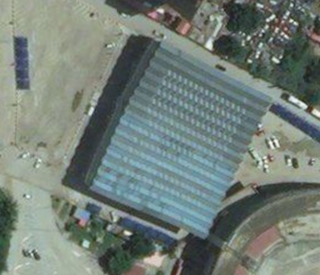Nossa Senhora may refer to the following places:
Dr. Fernando José de França Dias Van-Dúnem is an Angolan political figure who was the First Vice-President of the African Union's Pan-African Parliament. He is a member of the ruling Popular Movement for the Liberation of Angola (MPLA) and served as Prime Minister of Angola twice during the 1990s.
Osvaldo de Jesus Serra Van-Dúnem was an Angolan politician and diplomat. His surname is of flemish origin, from the well known angolan Family, "the Van-Dúnem family". He was appointed Interior Minister on 16 December 2002 by Prime Minister Fernando da Piedade Dias dos Santos.

Pavilhão Rosa Mota is an arena in Porto, Portugal. Pavilhão Rosa Mota opened in 1954 and holds 5,400 people. The pavilion was previously known as Pavilhão dos Desportos but in 1991 it was renamed after Rosa Mota, a Portuguese, European, World and Olympic champion in marathon running. It is primarily used for basketball.

Altice Arena is a multi-purpose indoor arena in Lisbon, Portugal. The arena is among the largest indoor arenas in the European Union and the largest in Portugal with a capacity of 20,000 people and was built in 1998 for Expo '98.

Anhembi Parque is a convention center located in Santana, a district of São Paulo, Brazil. At 400,000 square meters of indoor space and 93,000 meters of outdoor space, it is one of the largest event grounds in Latin America. The center is home to 20+ large annual fairs, each drawing in excess of 50,000 visitors, and hosts the annual Carnival of São Paulo.

Pavilhão da Cidadela is an Angolan indoor sporting arena located in Luanda, Angola. The capacity of the arena is 6,873 people. It is used to host the Atlético Petróleos Luanda and formerly of the Angola national basketball team before the appearance of Pavilhão Multiusos do Kilamba.
Afonso Van-Dunem aka M'Binda was an Angolan politician. Van-Dunem worked as the MPLA-Workers' Party representative in Zambia and Tanzania from 1970-72, as well as being elected to the Central Committee of the MPLA from 1976 onwards. He was also Minister of External Relations from 1985–89 and Permanent Representative to the United Nations from 1991–2000.
Pavilhão Multiusos de Coimbra is a multipurpose sports arena in Coimbra, Portugal adjacent to the Estádio Cidade de Coimbra stadium and the municipal swimming pools. Built in 2003, it is venue for Académica de Coimbra/Dolcevita basketball team, among other teams and events. Its owner is Coimbra's City Hall and it has 2,239 seats.
Serra is Latin for a "saw", Italian for greenhouse, and Galician, Portuguese and Catalan for mountain range or saw.
Van Dunem or Van-Dúnem is a surname. Notable people with the surname include:

Pavilhão Victorino Cunha, formerly Pavilhão do CODENM a.k.a. Pavilhão do Rio Seco is the Arena of Angolan side Primeiro de Agosto, mainly used for its Men's and Women's basketball teams. The arena is located in the uptown neighborhood of Maianga.
The Pavilhão Multiusos do Kilamba, also called Arena do Kilamba, is a state-owned multi-purpose indoor arena in Luanda, Angola. The arena has a seating capacity of 12,720, and features hardwood flooring, electronic scoreboard and a wide range of features that make it one of the most modern of its kind in Africa. It is therefore fit for such sports as Basketball, Handball, Volleyball and Roller Hockey.
Pavilhão Desportivo Municipal da Póvoa de Varzim, shortened to Pavilhão da Póvoa, is a multifunctional indoor arena located in Póvoa de Varzim, Portugal. It is owned by the City Hall of Póvoa de Varzim and managed by the Varzim Lazer, municipal company, who gets to manage most public sports venues in the city. It is the preferred home arena for the Portuguese volleyball team, also favored by the Portuguese federation of handball.
The following is a timeline of the history of the city of Benguela, Angola.

Isabel Salomé Benedito de Palma, best known as Belita Palma ,was an Angolan singer. With Lourdes Van-Dúnem, she is usually seen as a precursor in Angolan anti-colonial art, especially in her participation in the group N'gola Ritmos, of which she was lead singer.







